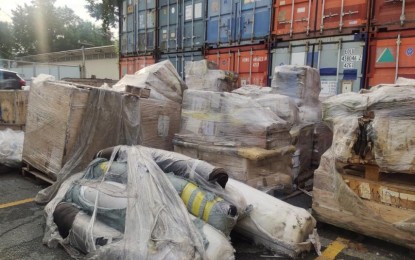
(File photo)
MANILA – The Bureau of Customs (BOC) on Wednesday issued rules and regulations on the proper disposal of forfeited goods through condemnation in ports across the country.
These rules are set in Customs Memorandum Order (CMO) No. 24-2021, which implements Customs Administrative Order (CAO) No. 3-2020 issued last year identifying goods that are subject to condemnation.
The order said these include forfeited and abandoned goods that are restricted and highly dangerous, absolutely prohibited or prohibited by law to be released, have no commercial value and are injurious to the public.
It added that the goods shall be condemned in any of the several modes such as rendering, crushing, thermal decomposition, and shredding, among others.
Under the CMO, a condemnation committee shall be created to evaluate the recommendation in the accreditation of a service contractor.
The group is also tasked to issue an order of condemnation and recommend the imposition of administrative and/or other sanctions as may be appropriate against any entity, subject to the approval of the District Collector of the concerned port.
Likewise, a supervising team for condemnation is created to ensure the condemnation procedure compliance until it reaches the condemnation facility, to its proper disposal and submission of the completion report.
The CMO also provides a uniform procedure and requirements in the accreditation of service contractors for condemnation of goods in line with Republic Act 11032 or the Ease of Doing Business and Efficient Government Service Delivery Act of 2018, as well as a mechanism to expedite the disposition and release of shipments for condemnation and assist the ports in decongesting overstaying containers.
For the first half of 2021, the BOC has disposed of 1,041 overstaying containers through auction and condemnation which resulted in improved trade facilitation by eliminating port and yard congestion. (PNA)
